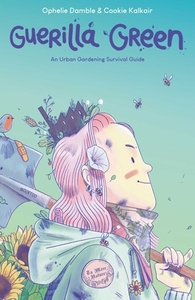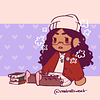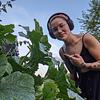You need to sign in or sign up before continuing.
Take a photo of a barcode or cover
hopeful
informative
inspiring
fast-paced
3.5 rounded up. Nothing all that new for me, but there are some great tips tucked in here and a lot of interesting history on the guerrilla gardening movement.
16 year old me would have loved this book but damn you know talk more about capitalism and drilling and exploitation I really think that needs to center every convo about climate change or it’s speaking from a place of serious privilege
funny
informative
inspiring
fast-paced
hopeful
informative
inspiring
medium-paced
A nice, informative read. Great starter for people just starting out.
I do wish this talked about invasive species and cautioned throwing random seeds around before doing research cuz introducing an invasive species that’s gonna kill native plants and animals is gonna do the opposite of what you want.
I do wish this talked about invasive species and cautioned throwing random seeds around before doing research cuz introducing an invasive species that’s gonna kill native plants and animals is gonna do the opposite of what you want.
informative
slow-paced
Oof. I really wanted to like this. The stars it does get are for the amount of historical information packed in. But it went off on multiple tangents about other topics that while somehow connected, blurred the purpose of this book. It seemed to seek intersectionality through those tangents but fell very short.
It provided some irresponsible information like suggesting to randomly plant mint, shamed people for certain behaviors or ways of living that may be impacted by poverty, etc, and had a skewed view of how guerilla gardening impacts the disabled. There was a section about a group of nuns that said: "They bring in disadvantaged groups (the ill, handicapped, or cut off) and encourage them to garden to help improve their mental and physical health." There was no mention of disabled people being part of the community outside of "being brought in to enjoy these things in groups" as if we aren't individual people in every community walking/rolling/adapting to the same streets as every other person. There is a section complaining about how planting fruit trees along sidewalks is only an issue if people refuse to pick up and use the fruit, which I also found dismissive of the existence of disabled folks in those communities. Maintained sidewalks are an accessibility need for every kind of human and this really overlooked that and failed to bring up the importance of considering overgrowth and maintenance after sowing. There was also no information on how to safely take care of yourself while guerilla gardening, especially if you are of a marginalized identity who may be racially profiled and targeted. And there was very little information on planting natives and how to do proper research on what should or can be done in your areas.
This definitely had a condescending "scream at you and convince you to join the cause" type vibes and ultimately it turned me off of the entire thing. I've definitely found much more inclusive, intersectional, and welcoming content about guerilla gardening that takes far more care and responsibility with the informative it shares and the actions it encourages.
It provided some irresponsible information like suggesting to randomly plant mint, shamed people for certain behaviors or ways of living that may be impacted by poverty, etc, and had a skewed view of how guerilla gardening impacts the disabled. There was a section about a group of nuns that said: "They bring in disadvantaged groups (the ill, handicapped, or cut off) and encourage them to garden to help improve their mental and physical health." There was no mention of disabled people being part of the community outside of "being brought in to enjoy these things in groups" as if we aren't individual people in every community walking/rolling/adapting to the same streets as every other person. There is a section complaining about how planting fruit trees along sidewalks is only an issue if people refuse to pick up and use the fruit, which I also found dismissive of the existence of disabled folks in those communities. Maintained sidewalks are an accessibility need for every kind of human and this really overlooked that and failed to bring up the importance of considering overgrowth and maintenance after sowing. There was also no information on how to safely take care of yourself while guerilla gardening, especially if you are of a marginalized identity who may be racially profiled and targeted. And there was very little information on planting natives and how to do proper research on what should or can be done in your areas.
This definitely had a condescending "scream at you and convince you to join the cause" type vibes and ultimately it turned me off of the entire thing. I've definitely found much more inclusive, intersectional, and welcoming content about guerilla gardening that takes far more care and responsibility with the informative it shares and the actions it encourages.
hopeful
informative
inspiring
I’m ready to get back into a bit of guerrilla gardening after being re-inspired by this graphic novel. Although written for a french audience, the stories of french market gardeners, trying to save good agricultural areas from being swallowed by cities and recommended readings are still interesting no matter where you live.
Lots of ideas in this book.
I really would love to see more community gardening happening in our inner city, by permission or by stealth if necessary. I’ve got my eye on a spot right now. The biggest obstacle is getting water to it.
Lots of ideas in this book.
I really would love to see more community gardening happening in our inner city, by permission or by stealth if necessary. I’ve got my eye on a spot right now. The biggest obstacle is getting water to it.







